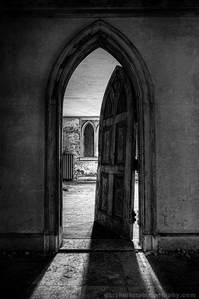
AN UNHINGED JESUS
John 2:13-22
Sunday, March 8, 2015
First Congregational Church of Cheshire
© the Rev. Dr. James Campbell
For the first 20 years of my life, I lived in the mortal fear of an angry God. The messages of my childhood church were filled with fear and self-loathing. We heard about a God who demanded that not one letter of the Law be broken, but then we also heard that we were fundamentally incapable of keeping that Law. And so God was angry. And that’s where Jesus came in.
I deserved to be punished on a cross, I was told. But Jesus took my place. I remember feeling grateful as a child that Jesus would do such a thing for me, but I certainly could not love a God who demanded such a horrible act. I feared that God.
That’s hard thing to live with, especially when you don’t fit society’s and the church’s mold, as I did not. So one day, as a young adult, I had simply had enough. I shed that theology like one sheds a jacket on a warm spring day. And I was born again as a liberal Christian. Suddenly, God wasn’t angry anymore, at least in my mind. Instead God was very, very nice. And humans weren’t so bad either.
And I was very happy with that new theology for some years. It helped me recover from the theological abuses of my childhood. But one of the unintended effects of dismissing the anger of God so completely was that sometimes, I had a hard time respecting God, because life is not always nice. People are not always good. There is also genocide and racial profiling and the denigration of women and the glorification of war and the unbridled greed that most Americans still admire. And the more I took those things seriously, the more I found that I needed a God who cared enough to be angry when the situation called for it.
I think many of us are OK with a God who is sometimes angry, but we keep Jesus in a separate category. Jesus Christ, meek and mild, the friend of sinners and lover of souls. And that’s all true of Jesus, thank God. But Jesus was also sometimes angry.
And that is how we find him today. The story of the Cleansing of the Temple is one of those stories found in all four Gospels, so it must be important. In Matthew, Mark, and Luke, this story is placed at the very end of the life of Jesus, and is presented as one of the straws that broke the camel’s back and led to the Cross. But in the Gospel of John, the Cleansing of the Temple is one of Jesus’s first public acts. And that means that John wants us to read his Gospel through that lens.
Here’s how John tells the story: Jesus, the faithful Jew, had gone up to Jerusalem to celebrate the Passover, with three or four hundred thousand other pilgrims. And as Jesus entered the Temple, that magnificent Herodian structure, he saw the merchants selling cattle and sheep and doves that were to be used as Temple sacrifices. And he saw the moneychangers sitting at their tables. And seeing that enraged him. He made a whip out of cords and drove them all out, both humans and beasts, and knocked over the moneychanger’s tables in the process. Now imagine that if you can: sheep and cows, bleating and mooing and running for their lives. Newly freed birds flapping about. Coins clanging and rolling. People cursing; others screaming for the police. And all the while an unhinged Jesus shouting at the top of his lungs: “Stop making my Father’s house a marketplace!”
So why was Jesus so upset?
Some have said that it was simply the presence of the merchants and moneychangers that upset Jesus. After all, this was a place of worship not a shopping mall. But what Jesus witnessed that day was in no way out of the ordinary and he had no doubt seen it before. The sacrificial system of ancient Judaism required that perfect animals be presented to God. And no one was going to bring Bessie the cow all the way from home. And so merchants sold animals at the Temple as a convenience to the faithful, as an aid to worship. Likewise, the moneychangers served an essential religious purpose. The official coinage bore the image of the Roman Emperor. And because they did, they broke the commandment to not have any graven images. So the moneychangers exchanged those verboten Roman coins for something called a Temple Shekel – an ecclesiastically approved form of money. So the coins and the animals were necessary.
Others scholars have suggested that Jesus was angry, not because the merchants and the moneychangers were there, but because they were taking economic advantage of the people. After all, they had a monopoly and the people had to pay whatever they said. This is even implied in the other three Gospels where Jesus accuses them of turning God’s house into a den of robbers. But John makes no such assumption in his telling of the life of Jesus.
Some other biblical scholars suggest that Jesus was reacting to what the system had become. Maybe, they say, the whole thing had grown so big and sophisticated and impersonal that it obscured the original purpose. In other words, the trappings of religion had come to substitute for its substance. And that’s a little too close to home.
So maybe it was that. But remember that John tells us this story early in his Gospel so that it will help to define his vision of Jesus. And while Jesus was sometimes critical of the religious system to which he belonged, it was not the bulk of his ministry. So maybe his anger had nothing to do with the presence of the animals and the moneychangers and the sacrificial system itself, but instead had everything to do with the location.
You see the marketplace was set up in the outer courtyard of the Temple. But this outer courtyard had another name: the Court of the Gentiles. There were Gentiles in that day known as God-worshippers. They weren’t converts to Judaism, but they were certainly interested. We call these folks “seekers” today. And since they weren’t converts, they could not enter the Temple proper. The Courtyard of the Gentiles was their place. And their place was being used to keep the Institution rolling in the dough! In other words, institutional solvency was more important than ministry to the least, the last, the lost, the unclean, the unacceptable, the less-than. Religion got in the way of radical hospitality. And since radical hospitality was Jesus’s thing, seeing it obstructed by religion made him angry. Really angry.
Seven weeks in as your minister, I have learned this about you: you are a wonderfully welcoming congregation. You have made us so welcome here. We feel it. But hospitality and openness and welcome is a continuous work. And just when we think we got it right, God sends us some stranger strangers to see if we really mean what we say.
Do we mean what we say? I think we do. But I think there is always more to learn. And I think it’s always a temptation to make religion the goal instead of the means. So let’s find ways to make the circle wider. Let’s invite the whole world to this table. Let’s not just open the proverbial doors of this church. Let’s take them off their hinges! And let us see what God can do.


 RSS Feed
RSS Feed